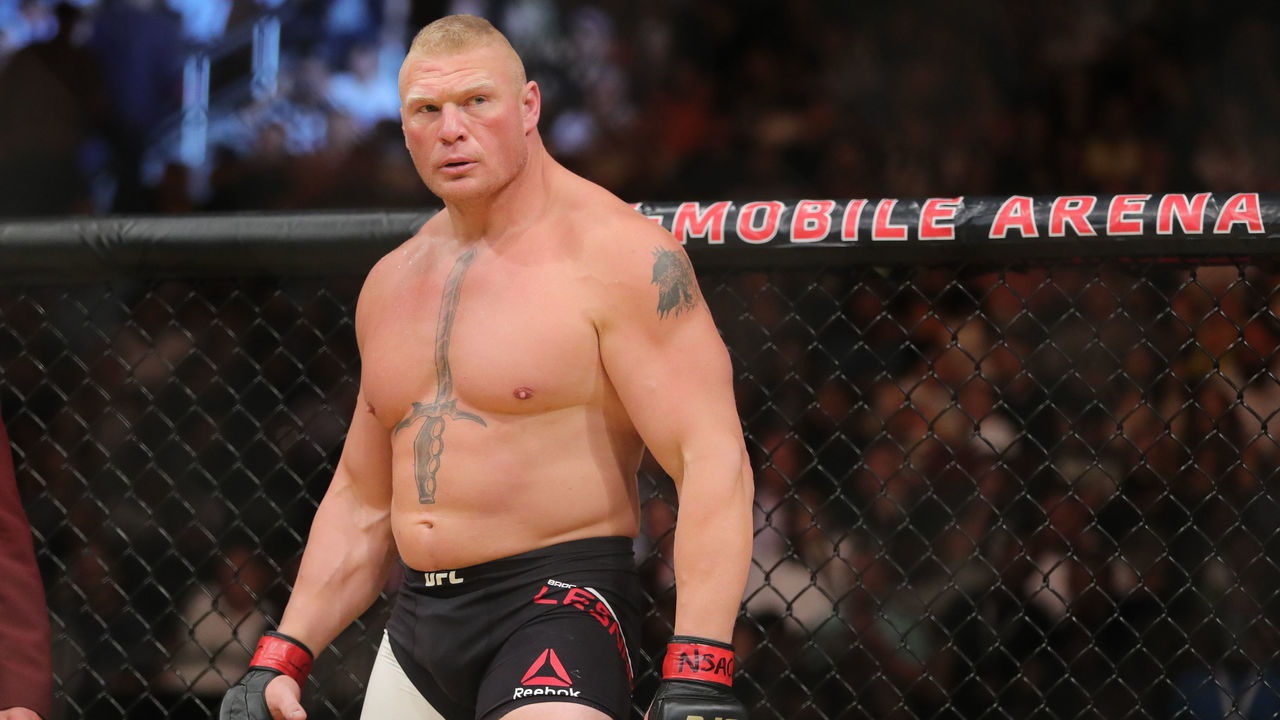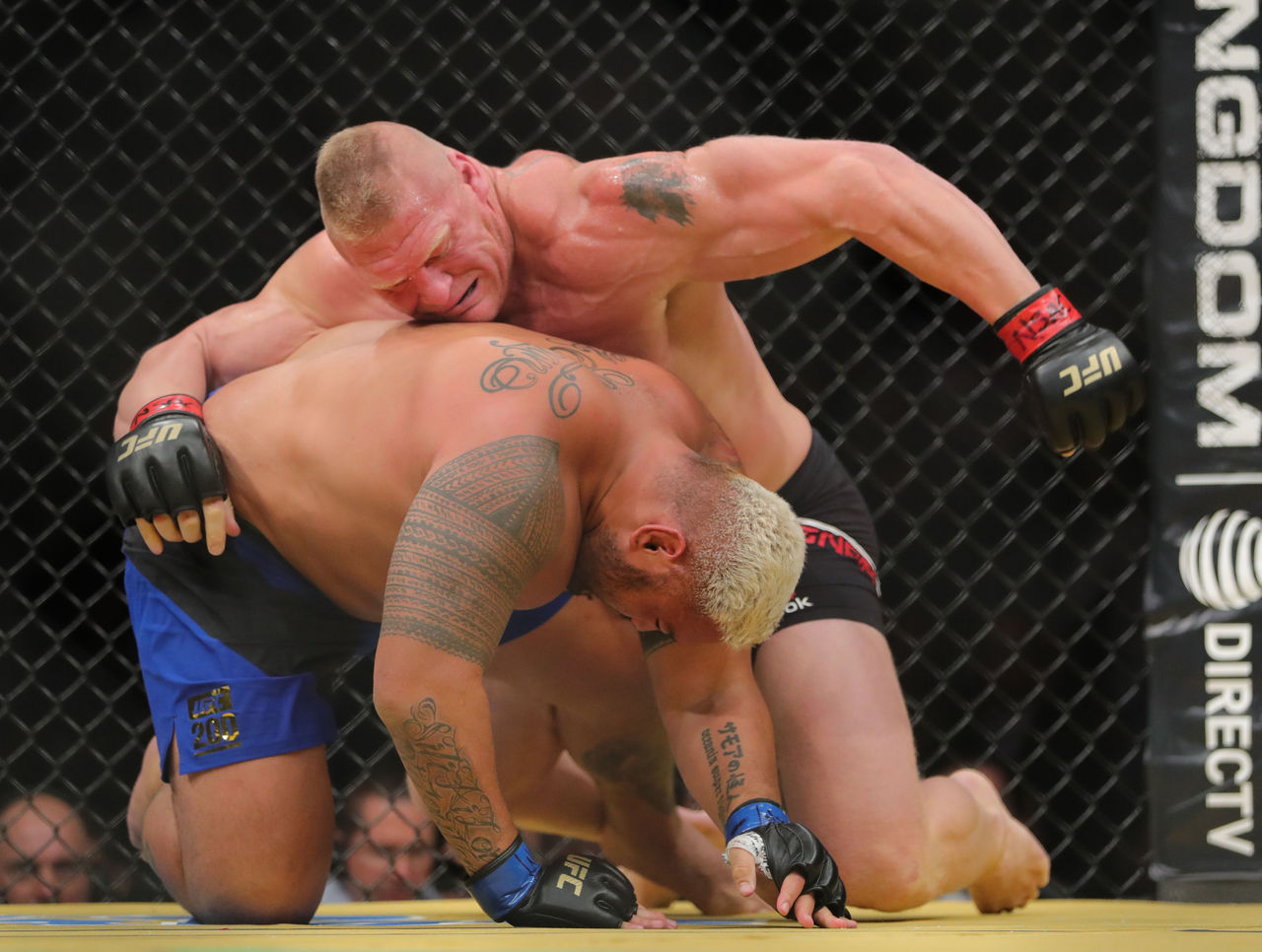Why the UFC shouldn't hand Brock Lesnar a title fight if he returns
Even a promotion as unpredictable as today's UFC will have to handle Brock Lesnar's potential MMA return cautiously.
Despite USADA exec Jeff Novitzky's claims to the contrary, word on the street says the former heavyweight champion and current WWE superstar may have re-entered the USADA testing pool after retiring from MMA in February, seven months into a one-year ban sanctioned by the UFC's anti-doping partner. Lesnar's decision to hang up his gloves put the suspension on ice, meaning that if a return to the Octagon is indeed in the cards, he won't see the inside of a cage until mid-December at the earliest.
The 40-year-old's WWE contract will reportedly expire after Wrestlemania 34 in April 2018, and if there's any truth to the recent rumblings, he likely won't be re-upping with the Vince McMahon-led outfit. But whether his expiring commitment to the WWE would keep him from fulfilling his outstanding contract with Dana White and Co., is uncertain.
Regardless, with Conor McGregor bound for the boxing ring, Ronda Rousey all but retired, and Jon Jones always one debaucherous weekend away from another fall from grace, the UFC brass must be salivating at the prospect of bringing a proven pay-per-view draw in Lesnar back into the fold.

Based on star power alone (he's headlined four cards with buyrates north of 1 million pay-per-views), pitting Lesnar in a title bout isn't outside the realm of possibility, but as lucrative as a marquee date may be for all parties involved, it's in the UFC's best interest to play the (comparatively) long game.
The everlasting trump card known as the CM Punk experiment aside, welcoming Lesnar - a far more accomplished athlete - back to the world's top fight factory is far from a zany notion. He remains capable of grinding out a few wins with his D-I wrestling and thickening the title picture of a talent-starved, top-heavy division. But most importantly, he can make the UFC money. That being said, if the brass intends to milk what's left of his potential to fill its coffers, as opposed to cashing in on a one-and-done, pitting him opposite a destroyer in heavyweight king Stipe Miocic is the wrong move.
Holding on to the near-obsolete, age-old school of thought, to deem the former champ lacking in the merit department would be an understatement. Having tested positive for banned substances in a July return against Mark Hunt that was subsequently overturned from a unanimous decision win to a no-contest, Lesnar finds himself on a two-fight skid, with both losses coming by first-round stoppage.

Say the UFC does the morally unfathomable - albeit highly possible - and pits him against the baddest man on the planet. Lesnar's threshold for pain has been notoriously suspect, and the ugly truth is, he may very well get trounced by Miocic - who's looked downright invincible over the past two years - and see his drawing power wither away to bubkus by an embarrassing defeat, much to the chagrin of the powers that be.
Between the mileage accrued in wrestling, the cage, and the squared circle, Lesnar likely has no more than a couple of fights left in him. Assuming he'll spend the twilight of his career in the UFC, for the sake of argument, it benefits the bosses to book him opposite worthy but beatable opponents, such as fan favorite Derrick Lewis or Alexander Volkov.
That way, if and when he hangs up his gloves for good, he can ride off to the Saskatchewan prairies with a few seven-figure checks in his pocket (he made $2.5 million fighting Hunt at UFC 200), the geriatric heavyweight division can plod along unimpeded, and the brass will have maximized their return on a relatively short-term investment.
Of course, Lesnar could just be seeking leverage for when his WWE deal expires, but if money talks, optimization should be the name of the game for both him and the UFC.
(Photos courtesy: Getty Images)